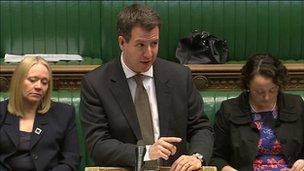Mansion tax: Labour defeated in Commons after Lib Dems side with coalition partners
- Published

Labour's efforts to court Lib Dem support failed
MPs have rejected Labour calls for a "mansion tax" on properties worth more than £2m to be introduced before the next general election.
Conservative and Lib Dem MPs joined forces to defeat the move by 63 votes after a Commons debate.
The Lib Dems, who support the principle of such a tax, said Labour were simply trying to exploit coalition differences over the issue in an "infantile" move.
But Labour accused the Lib Dems of "suppressing their principles".
Labour recently adopted the idea of a mansion tax, first put forward by the Lib Dems in opposition but opposed by the Tories, saying it would pay for the reinstatement of the 10 pence income tax band scrapped by Gordon Brown in 2009.
Labour urged the Lib Dems to back it in a Commons vote, but its motion calling for a mansion tax to be introduced at the earliest opportunity to "fund a tax cut for millions of people on middle and low incomes" was defeated by 304 votes to 241.
A subsequent amendment put forward by David Cameron and Nick Clegg in which the coalition partners put on record their different positions on the issue but stated their agreement on other tax matters and achievements in office was approved by 55 votes.
Lib Dem housing minister Don Foster said this enabled the party's MPs to "reiterate their support" for the idea without putting the coalition's future at risk.
Labour, he argued, was "trying to drive a wedge" between the coalition partners in an "infantile" and "cynical" manner. "Both parties know where they stand (on the mansion tax) and the public is also clear," he said.
Making his party's case, Shadow Treasury Minister Chris Leslie said the mansion tax would narrow what he said was a growing gap between low and middle income workers and the "top 1%", who were set to benefit from an income tax cut while others were "squeezed".
'Clinging to power'
Mr Leslie said it would be "astonishing" if the party did not endorse a policy from its 2010 manifesto and suggested it would demonstrate that they were "suppressing their principles in a bid to cling onto power".
The Lib Dems originally announced the policy at their 2009 party conference but were quickly forced to rethink the threshold for properties that would be covered, raising it from £1m to £2m, amid concerns about the number of people who would be affected.
Conservative Brandon Lewis: Mansion tax is not practical to deliver
Chancellor George Osborne and other leading Conservatives have long opposed the idea and it has never become coalition policy. However, it remains Lib Dem policy and retains support among activists and MPs.
The Lib Dems said on Monday they would not be voting with Labour and would instead back an amendment stating that "the part of the coalition led by the deputy prime minister (Nick Clegg)" advocates the idea, while "the part of the coalition led by the prime minister does not".
The amendment, also backed by Conservative MPs, set out the areas of tax policy that the two parties agree, such as their goal of raising the threshold at which people start to pay income tax to £10,000 by the end of the current Parliament.
'Pathetic'
According to Labour, there are about 70,000 homes currently worth more than £2m - half of which are second homes. Although the party acknowledges the detail of the policy will have to be worked out, it believes it could raise an estimated £2bn.
Speaking in Tuesday's debate, Lib Dem MP Stephen Williams said he agreed property wealth in the UK was "woefully under-taxed" but he said Labour were wrong to link the mansion tax to the re-introduction of the 10p tax band, describing it as a "completely ineffective" measure.
Conservative Treasury minister David Gauke said Labour had done "little or nothing" to increase taxes on expensive property transactions while in government but had now "converted" to the idea for "transparently political purposes".
"It is pathetic, it is insincere and lacks any sense of credibility," he told MPs.
Labour had not committed to including the policy in its next manifesto, he suggested, and he contrasted the coalition's move to lift the starting point at which people begin paying tax with Labour's decision to scrap the 10p tax band.
In last year's Budget, the coalition raised stamp duty on sales of properties worth more than £2m to 7% and increased the levy on properties bought via a company to 15%. However, the Lib Dems say they want to do more to shift the burden on tax away from work to assets.
- Published14 February 2013
- Published21 March 2012
- Published8 March 2012